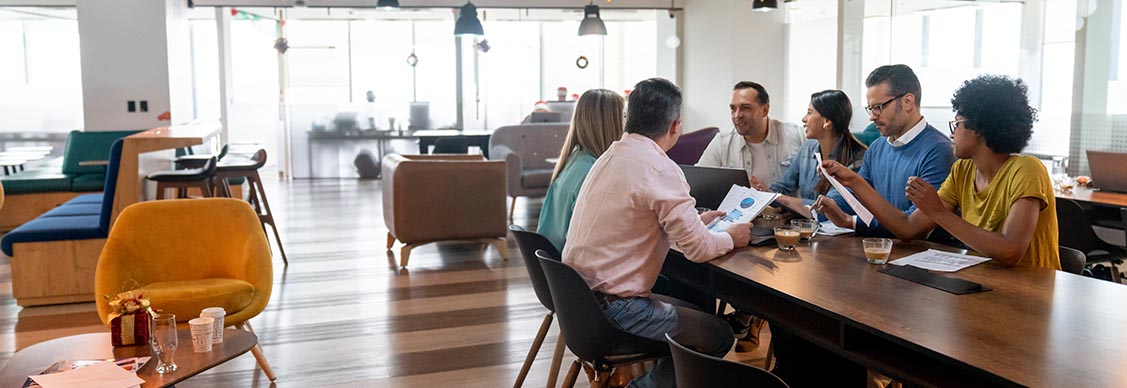Why companies are turning to modular office furniture
More enterprises look to increase office adaptability for hybrid work
As people’s workdays become more flexible, their office spaces are following suit.
More companies are seeking and implementing clever ways to make offices fit the modern worker’s needs with modular design – think acoustic panels, storage units and room dividers – which allow employees to use the same space for different needs.
For instance, easily stored seating cubes can create a small auditorium-style area that enables town halls without designating permanent space capable of hosting the entire staff. Movable shelves are doing double duty as storage and flexible partitioning for ad-hoc meeting space.
“Multi-functional spaces, and furniture that enables open-plan areas to be temporarily repurposed for meetings, gives organizations the flexibility to scale up or down according to changing occupancy and needs,” explains Guzman de Yarza Blache, JLL Head of Workplace Strategy, EMEA.
Take the Johannesburg office of global law firm Norton Rose Fulbright, who after reducing their footprint by half, used efficient design tactics such as sliding, stacking doors that enable intimate rooms to expand for larger functions. Or EY’s new headquarters in Milan, which incorporates plenty of space-optimizing furniture that allows for quick shifts from conference to teamwork mode, as well as easily stacked chairs on wheels and flip-top folding tables for customizable training areas.
A desire among companies for futureproof real estate is nothing new, but the pandemic has accelerated discussions on how to rethink office spaces.
“With permanent shifts in working patterns now widely acknowledged, it’s not just location or square footage that needs careful consideration. Versatile furniture can play a starring role in reshaping the office for agility, as organizations look to transform their spaces and respond to changes in workplace culture,” says Yarza Blache.
A tall, draughtsman style table, for example, gives the option for seated or standing work, can be used for group collaboration and team huddles, or as an individual workstation for focused tasks. And if floorplans are reconfigured, or an organization moves location, multipurpose furniture is more likely to adapt to an entirely new space.
Putting people first
Companies are also being drawn to modular furniture amid increased demand from employees to raise health and wellbeing standards. These quality-of-life issues have become top priorities for office workers, even above their salary, according to JLL’s 2022 Workforce Preferences Barometer.
“With office fit-out now evolving to support both high performance work and employee wellbeing, we have seen the emergence of homely ‘resimercial’ furniture and design layouts,” says Betty Surgis, Tétris Head of Furniture Solutions EMEA.
“This puts people first by mixing domestic interiors with traditional workplace aspects, making the office a comfortable ‘home from home’ and producing collaborative and agile spaces that people want to spend time in.”
It’s a concept that can be seen in abundance in the UK office of global tech firm, Campaign Monitor, where flexibility and comfort is key. Multi-use areas feature tables in interesting shapes which can be reconfigured through linking elements and moved on castors.
Once again, modular seating comes into its own, offering employees choice by dividing spaces into zones for different types of work, or intimate private areas for informal chats or focused reading. What’s more, these spaces can easily accommodate later changes in office culture and are endlessly configurable as teams shrink, expand or move.
Sustainable in more ways than one
Modular or multi-purpose furniture doesn’t just make good financial sense.
In the UK, an estimated 1.2 million office desks and 1.8 million office chairs end up in landfill each year, while U.S. Environmental Protection Agency (EPA) figures puts overall annual furniture waste at almost 10 million tonnes.
“A more sustainable approach to office design is long overdue and flexible furniture solutions not designated for just one task, can avoid these issues, easily fulfilling multiple purposes over their lifetime - or even during a single working day,” says Surgis.
The highly adaptable office space of Fintech company Wise took this one step further, not only upcycling and re-upholstering existing furniture, but implementing forward thinking materials, like ROOM booths which are made of 1,088 recycled plastic bottles.
“As a win-win situation for the environment, the employee and budget conscious enterprises with ambitious decarbonization targets, modular furniture is something that more organizations will be looking at closely as long-term hybrid work strategies are put in place,” Surgis concludes.
